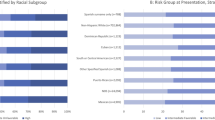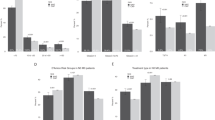Abstract
Background:
African-American men with prostate cancer typically have higher tumor risk at diagnosis, lower rates of surgical treatment and poorer cancer-specific survival compared with Caucasians. Receipt of care within the Veterans Affairs (VA) healthcare system may reduce barriers that influence these disparities.
Methods:
We sampled 1258 men with nonmetastatic prostate cancer diagnosed at the Greater Los Angeles and Long Beach VA Medical Centers between 1998 and 2004. We compared African Americans and Caucasians with respect to tumor characteristics using ordinal logistic regression, treatment choice across substrata of tumor risk using logistic regression, and cancer-specific and other-cause mortality using competing risks regression analysis.
Results:
Multivariate ordinal logistic regression revealed no significant differences in odds of higher tumor risk (odds ratio (OR) 1.22, 95% confidence interval (CI) 0.98–1.53, P=0.08), Gleason score (OR 0.90, 95% CI 0.7–1.16, P=0.4) or clinical stage (OR 1.04, 95% CI 0.79–1.38, P=0.8) for African Americans compared with Caucasians. African-American men had similar odds of aggressive treatment as did Caucasians for low-risk (OR 0.92, 95% CI 0.57–1.53, P=0.8), intermediate-risk (OR 0.75, 95% CI 0.44–1.26, P=0.3) and high-risk disease (OR 0.87, 95% CI 0.52–1.44, P=0.6). In competing risks regression analysis, African Americans had a lower but nonsignificant hazard of cancer-specific mortality compared with Caucasians (sub-hazard ratio 0.6, 95% CI 0.28–1.26, P=0.2) and nearly identical risk of other-cause mortality (sub-hazard ratio 0.98, 95% CI 0.78–1.22, P=0.8).
Conclusions:
We found no significant differences in tumor burden, treatment choice or survival outcomes between African Americans and Caucasians cared for in the equal-access VA Healthcare setting.
This is a preview of subscription content, access via your institution
Access options
Subscribe to this journal
Receive 4 print issues and online access
$259.00 per year
only $64.75 per issue
Buy this article
- Purchase on Springer Link
- Instant access to full article PDF
Prices may be subject to local taxes which are calculated during checkout

Similar content being viewed by others
References
U.S. Cancer Statistics Working Group United States Cancer Statistics: 1999–2010 Incidence and Mortality Web-based Report. Department of Health and Human Services, Centers for Disease Control and Prevention and National Cancer Institute: Atlanta: US, 2013 Available at: www.cdc.gov/uscs. Accessed 4 June 2014.
Hoffman RM, Gilliland FD, Eley JW, Harlan LC, Stephenson RA, Stanford JL et al. Racial and ethnic differences in advanced-stage PCa: the PCa Outcomes Study. J Natl Cancer Inst 2001; 93: 388–395.
Imperato PJ, Nenner RP, Will TO . Radical prostatectomy: lower rates among African American men. J Natl Med Assoc 1996; 88: 589–594.
Moses KA, Paciorek AT, Penson DF, Carroll PR, Master VA . Impact of ethnicity on primary treatment choice and mortality in men with PCa: data from CaPSURE. J Clin Oncol 2010; 28: 1069–1074.
National Cancer Institute: Surveillance, Epidemiology and End Results. Cancer Statistics by Race/Ethnicity. Available at: http://seer.cancer.gov/statistics/types/raceethnicity.html. Accessed 4 June 2014.
Aizer AA, Wilhite TJ, Chen MH, Graham PL, Choueiri TK, Hoffman KE et al. Lack of reduction in racial disparities in cancer-specific mortality over a 20-year period. Cancer 2014; 120: 1532–1539.
Moul JW, Sesterhenn IA, Connelly RR, Douglas T, Srivastava S, Mostofi FK et al. Prostate-specific antigen values at the time of PCa diagnosis in African American men. JAMA 1995; 274: 1277–1281.
Hamilton RJ, Aronson WJ, Presti JC Jr, Terris MK, Kane CH, Amling CL et al. Race biochemical disease recurrence, and prostate-specific antigen doubling time after radical prostatectomy: results from the SEARCH database. Cancer 2007; 110: 2202–2209.
Chu DI, Moreira DM, Gerber L, Presti JC Jr, Aronson WJ, Terris MK et al. Effect of race and socioeconomic status on surgical margins and biochemical outcomes in an equal-access health care setting: results from the Shared Equal Access Regional Cancer Hospital (SEARCH) database. Cancer 2012; 118: 4999–5007.
Graham-Steed T, Uchio E, Wells CK, Asian M, Ko J, Concato J . 'Race' and prostate cancer mortality in equal-access healthcare systems. Am J Med 2013; 126: 1084–1088.
Optenberg SA, Thompson IM, Friedrichs P, Wojcik B, Stein CR, Kramer B . Race treatment, and long-term survival from prostate cancer in an equal-access medical care delivery system. JAMA 1995; 274: 1599–1605.
Charlson ME, Pompei P, Ales KL, MacKenzie CR . A new method of classifying prognostic comorbidity in longitudinal studies: development and validation. J Chronic Dis 1987; 40: 373–383.
D'Amico AV, Whittington R, Malkowicz SB, Schultz D, Blank K, Broderick GA et al. Biochemical outcome after radical prostatectomy, external beam radiation therapy, or interstitial radiation therapy for clinically localized prostate cancer. JAMA 1998; 280: 969–974.
Boorjian SA, Karnes RJ, Rangel LJ, Bergstralh EJ, Blute ML . Mayo Clinic validation of the D'amico risk group classification for predicting survival following radical prostatectomy. J Urol 2008; 179: 1354–1360.
Daskivich TJ, Chamie K, Kwan L, Labo J, Dash A, Greenfield S et al. Comorbidity and competing risks for mortality in men with prostate cancer. Cancer 2011; 117: 4642–4650.
Fine JP, Gray RJ . A proportional hazards model for the subdistribution of competing risk. J Am Stat Assoc 1999; 94: 496–509.
Hoffman RM, Harlan LC, Klabunde CN, Gilliland FD, Stephenson RA, Hunt WC et al. Racial differences in initial treatment for clinically localized prostate cancer: results from the prostate cancer outcomes study. J Gen Intern Med 2003; 18: 845–853.
Shavers VL, Brown ML, Potosky AL, Klabunde CN, Davis WW, Moul JW et al. Race/ethnicity and the receipt of watchful waiting for the initial management of prostate cancer. J Gen Intern Med 2004; 19: 146–155.
Underwood W 3rd, Jackson J, Wei JT, Dunn R, Baker E, Demonner S et al. Racial treatment trends in localized/regional prostate carcinoma: 1992-1999. Cancer 2005; 103: 538–545.
Robbins AS, Yin D, Parikh-Patel A . Differences in prognostic factors and survival among white men and black men with prostate cancer, California, 1995-2004. Am J Epidemiol 2007; 166: 71–78.
Merrill RM, Lyon JL . Explaining the difference in prostate cancer mortality rates between white and black men in the United States. Urology 2000; 55: 730–735.
Mahal BA, Ziehr DR, AIzer AA, Hyatt AS, Sammon JD, Schmid M et al. Getting back to equal: the influence of insurance status on racial disparities in the treatment of African American men with high-risk prostate cancer. Urol Oncol 2014; 32: 1285–1291.
Freedland SJ, Amling CL, Dorey F, Kane CJ, Presti JC Jr, Terris MK et al. Race as an outcome predictor after radical prostatectomy: results from the Shared Equal Access Regional Cancer Hospital (SEARCH) database. Urology 2002; 60: 670–674.
Acknowledgements
TJD is funded by grants from the Urology Care Foundation and American Cancer Society (124225-PF-13-014-01-CPHPS).
Disclosure
The funding organizations had no role in the design and conduct of the study; the collection, management, analysis and interpretation of the data; the preparation, review or approval of the manuscript; or the decision to submit the manuscript for publication.
Author information
Authors and Affiliations
Corresponding author
Ethics declarations
Competing interests
The authors declare no conflict of interest.
Rights and permissions
About this article
Cite this article
Daskivich, T., Kwan, L., Dash, A. et al. Racial parity in tumor burden, treatment choice and survival outcomes in men with prostate cancer in the VA healthcare system. Prostate Cancer Prostatic Dis 18, 104–109 (2015). https://doi.org/10.1038/pcan.2014.51
Received:
Revised:
Accepted:
Published:
Issue Date:
DOI: https://doi.org/10.1038/pcan.2014.51
This article is cited by
-
Five-year survival of patients with late-stage prostate cancer: comparison of the Military Health System and the U.S. general population
British Journal of Cancer (2023)
-
Regional trends in average years of potential life lost (AYPLL) secondary to prostate cancer deaths among Caucasians and African Americans treated by surgery or radiation
International Urology and Nephrology (2019)
-
Race and overall survival in men diagnosed with prostate cancer in the Department of Defense Military Health System, 1990–2010
Cancer Causes & Control (2019)
-
African-American Prostate Cancer Disparities
Current Urology Reports (2017)



